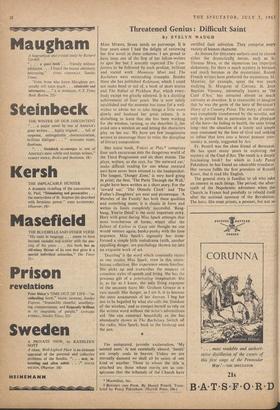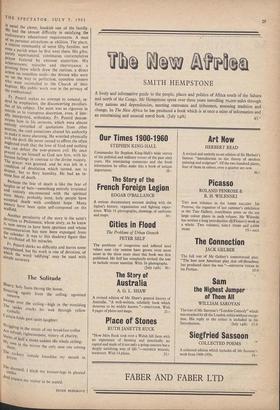Threatened Genius : Difficult Saint
By EVELYN WAUGH
MISS MURIEL SPARK needs no patronage. It is four years since I had the delight of reviewing her first novel in these columns. I am proud to have been one of the first of her fellow-writers to spot her but I scarcely expected The Com- forters to be followed by such profuse, brilliant and varied work. Memento Mori and The Bachelors were outstanding triumphs. Besides these she has published Robinson, which I could not make head or tail of, a book of short stories and The Ballad of Peckham Rye, which every- body except me greatly admired. It is a dazzling achievement of four years. She is now safely established and the moment has come for a well- wisher to advise her to take things a little more slowly and husband her great talents. It is disturbing to learn that she has been working for the wireless, turning, as she describes it, her mind into a wireless set and letting the characters play on her ear. We have too few imaginative writers to encourage them to relax the discipline .oiliterary composition.
Her latest book, Voices at Play,* comprises four such excursions into the dangerous world of the Third Programme and six short stories. The plays, written, as she says, for The outward ear,' make difficult reading for one whose outward ears have never been attuned to the loudspeaker. The longest, 'Danger Zone,' is very, hard going In print; the best, 'The Party Through the Wall,' might have been written as a short story. For the 'inward ear,' The Ormolu Clock' and The Father's Daughters' are neat and picturesque. 'A Member of the Family' has both these qualities and something more; it is classic in form and within its limits completely' successful. 'Bang- bang, You're Dead' is the most important story. Here with great daring Miss Spark attempts that most treacherous of forms, where. after the failure of Eyeless in Gaza one thought no one would venture again, hanky-panky with the time sequence. Miss Spark's ingenuity has trans- formed a simple little melodrama (with, another appalling danger, sex-psychology thrown in) into an exquisite work of art.
'Dazzling' is the word which constantly recurs as one studies Miss Spark, even in this unam- bitious collection. Her experience seems limitless She picks up and transcribes the nuances of countless styles of speech and living. She has the precious gift of a penetrating imagination. She is, as far as I know, the only living exponent of the uncanny (save Mr. Graham Greene in a rare mood). Her danger, as I see it, is to become the mere amanuensis of her demon. I beg her not to be beguiled by what she calls the 'freedom of the wireless,' and to compel herself to rely on the written word without the actor's adventitious aid. She can construct beautifully as she has abundantly shown in The Bachelors. Switch off the radio, Miss Spark; back to the foolscap and the pen.
The antiquated, juvenile exclamation, 'My sainted aunt,' is not essentially absurd. 'Saints' are simply souls in heaven. 'Unless we are eternally damned we shall all be saints of one kind or another. Those to whom the title is attached are those whose merits are SO con- spicuous that the tribunals of the Church have — ---- * Macmillan, 16s.
t BLESSED AND Pam By Daniel Pezeril. Trans- lated by Pansy Pakenham. (Harvill Press, 18s.) certified their salvation. They comprise every variety of human character.
As themes for literature authors tend to choose '
either, the dramatically heroic, such as St Thomas More, or the mysterious (an imperfect dichotomy, for there is much mystery in heroism and much heroism in the mysterious). Recent French writers have preferred the mysterious. M
Mauriac, for example, spent the war years studying St. Margaret of Cortona. St. Jean
Baptiste Vianney, universally known as 'the
Curd d'Ars,' has attracted almost as much curiosity as devotion. It is reasonable to imagine
that he was the germ of the hero of Bernanos's Diary of a Country Priest. The 'story, of course was completely transformed by the novelist, no only in period but in particular in the physique of the hero—he failing in health, the saint living long—but the situation of a lonely and simple man consumed by the love of God and seeking to infuse that love into a brutal , peasant corn munity is, surely, suggested by Ars.
Fr. Pezeril was the close friend of Bernanos He has spent many years in exploring the mystery of the Cutid'Ars. The result is a deeply
fascinating bookt for which in Lady Pansy Pakenham he has found an admirable translator. Her version fulfils the first postulate of Ronald Knox, that it read like English.
The general story is familiar to all who take an interest in such things. The period; the after.
math of the Napoleonic adventure when the Church in France had painfully to rebuild itself after the national apostasy of the Revolution The hero; like most priests, a peasant, but not as IS usual the clever, bookish one a the family. He had the utmost difficulty in satisfying the rudimentary educational requirements. A man of no personal attractions or abilities. The place; a remote community of some fifty families, not even a parish when he first went there. His gifts; Purely supernatural, continuous contemplative Prayer fostered by extreme austerities. His achievements; miracles and clairvoyance, a growing fame which drew the curious, a direct action on countless souls—the devout who were set on the way to perfection, countless sinners Who were reconciled to the Church of their baptism. His public work was in the privacy of the confessional.
Fr. Pezeril makes no attempt to conceal, in- deed he emphasises, the disconcerting peculiari- ties of his subject. The saint was so rigorous in morals as to transgress discretion, even, if liter- ally interpreted, orthodoxy. Fr. Pezeril demon- strates how in his sermons, which were almost entirely compiled of quotations from other sources, the curd sometimes altered his authority to make it more alarming. He wrestled physically With the devil. He never ceased to affirm the often neglected truth that the love of God and nothing else can defeat the ever-present evil. He once Prayed to see himself as God saw him, with his human failings in contrast to the divine majesty. The prayer was granted, and he was left in a Condition of desolation which turned, not to despair, but to fiery humility. He had an in- , tense fear of death.
h perhaps the fear of death is like the fear of eights or of bats—something entirely irrational and • entirely unconnected with the spiritual state. Many, probably most, holy people have accepted death with confident hope. Many sinners have been quite self-composed on the scaffold.
Another peculiarity of the story is the saint's devotion to Philomena, whose story, as he knew it, now seems to have been spurious and whose Commemoration has now been expunged from the calendar. It was to this shadowy figure that he attributed all his miracles.
Fr. Pezeril shirks no difficulty and leaves some as_n.explained, but his work is one of devotion, of
Which the word `edifying' may be used with simple accuracy.



























































 Previous page
Previous page